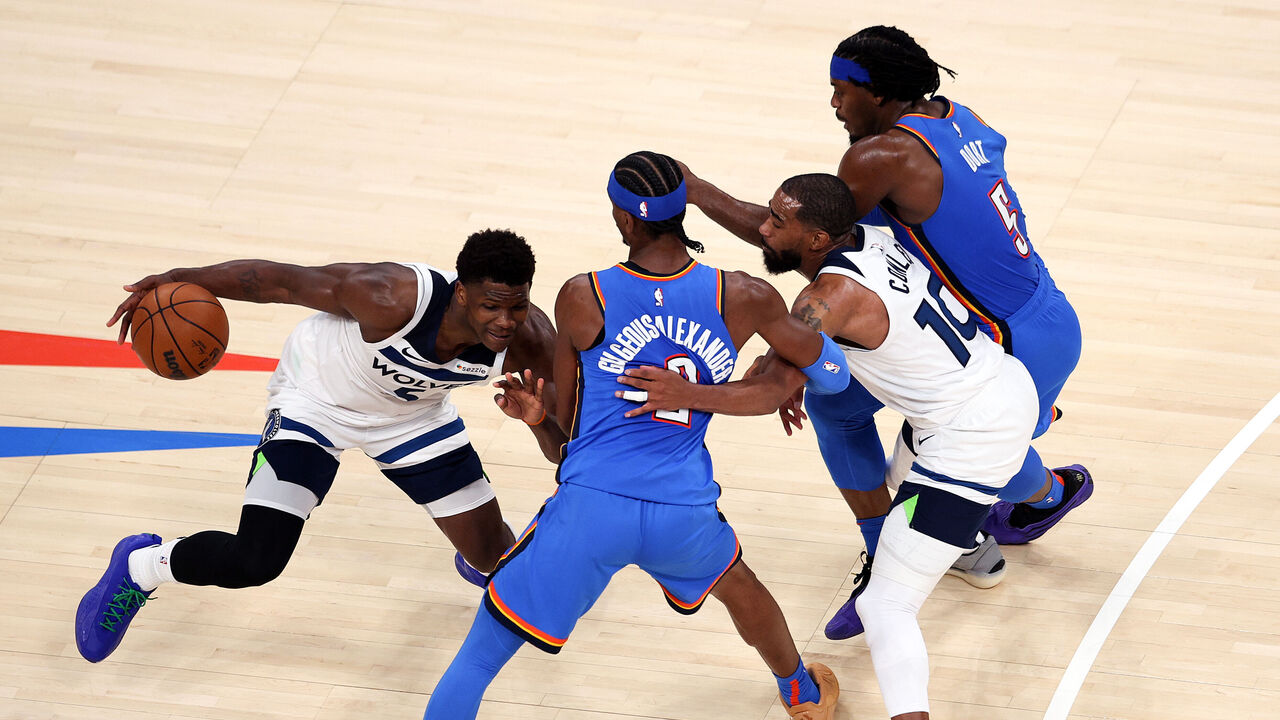Anthony Edwards' maturation was on full display this postseason
When the sting of another lopsided conference finals loss subsides, Minnesota Timberwolves fans will hopefully be left with the same perspective on their team's latest playoff run that their franchise player had already adopted by the time the buzzer sounded on Wednesday's Game 5 Oklahoma City Thunder rout.
"It's exciting for me," Anthony Edwards told reporters from the dais, shortly after Minnesota's season ended the same way it did a year ago. "I'm 23. I get to do it a whole bunch of times."
Unbridled self-belief has been a major part of Edwards' brand since he entered the league, but no one can say he hasn't earned it. Atop his foundation of preposterous physical gifts, he's built out a beautiful and ruthlessly effective game to the point that he's firmly a top-10 player in the world five seasons into his career.
In the process, he's transformed a franchise that won two playoff series in its first 34 years of existence. With him at the reins, the Wolves tripled that total in just the last two years by conquering the likes of Luka Doncic and LeBron James, Nikola Jokic and Jamal Murray, Kevin Durant and Devin Booker. The team's whole identity has flowed out from his fearlessness, his swagger, his assertiveness, and his willingness to get his hands dirty on defense.
The series against the Thunder certainly wasn't Edwards' best, but it may have been the most illuminating because of the particular ways it challenged him - and the way he largely rose to meet those challenges. Throughout the series, he dealt with relentless pressure on and off the ball from a revolving door of all-world defenders. Any time he managed to shake one of them, he was met by one or two others. He was given no airspace, and none of his teammates were able to give him the reprieve he needed as a creator. Still, until he ran out of gas in Game 5, he continued looking for every opportunity to plunge into the belly of OKC's beastly defense despite the suboptimal spacing around him.
He'd already honed the footwork required to navigate those tight corridors, but the sturdiness of his handle in traffic might've been the most important and encouraging development of these playoffs for Minnesota. That was reflected in the fact that he saw only a tiny blip in his turnover rate against a team that rips more steals than any team in the 21st century. Against one of the best and most help-heavy interior defenses of the pace-and-space era, he shot 63% from 2-point range, including 74% on his drives.

It was the culmination of a postseason in which Edwards navigated a variety of schemes designed to throw him out of rhythm and limit the damage he could inflict as a scorer. Almost without fail, he found the pressure points in those coverages and attacked them in the most effective way possible, whether that meant finding avenues to score or leaning into his evolving playmaking capabilities.
He didn't nail every read against OKC, but he never stopped trusting the pass or creating great looks for his teammates by getting off the ball early and often. To wit: he passed out of 44% of his drives in the series, up from 33% in the regular season and 31% in the first two rounds of the playoffs, per NBA Advanced Stats.
All told, his rim frequency leapt from 26% during the regular season to 35% in the playoffs. That's particularly notable because getting to the cup gets more difficult in the postseason (league-wide frequency dipped from 31.2% to 29.1% this year, per Cleaning the Glass). His ability to finish came and went as he dealt with heavy traffic in front of the basket, and he sometimes tried to force things because he didn't trust his mid-ranger enough, but the overall impact of his downhill pressure was massively positive. He also shot 55% from floater range, finding an important counter in an area of the court he'd struggled with for most of his entire career.
Edwards is still far from a fully formed player. To get past the conference final stage, he'll need to become a more proactive playmaker rather than just a reactive one, continue developing his in-between game, and grow into a more proficient post operator, on top of making micro-improvements in areas where he already excels.
But given the strides we've seen him take every year, it's easy to believe that he'll do everything to hit every item on that checklist. It's easy to believe him when he says, "Nobody's going to work harder than me this summer." And it's easy to believe that he'll have the Wolves back here again soon, with a great chance to clear the final two hurdles in their path.
Joe Wolfond writes about the NBA for theScore.
HEADLINES
- Herro out 8 weeks, will miss start of season after ankle surgery
- Kuminga's agent: 'A lot of upside' if he signs Warriors' qualifying offer
- Report: Clippers sent Aspiration $32.4M same day Kawhi inked 'no-show' deal
- What the Kawhi scandal reveals about the NBA's myth of fairness
- Silver: New Euro basketball league could launch in 2027 or '28